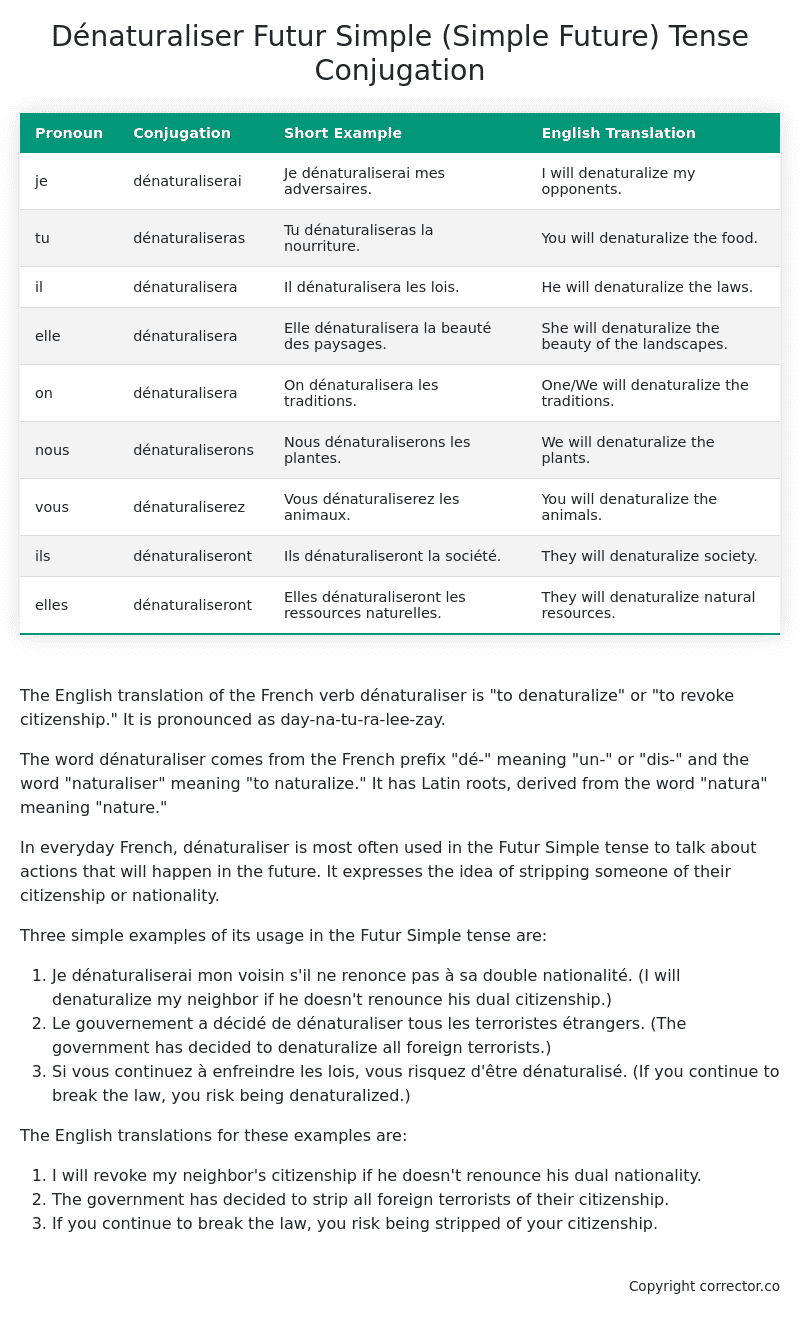Futur Simple (Simple Future) Tense Conjugation of the French Verb dénaturaliser
Introduction to the verb dénaturaliser
The English translation of the French verb dénaturaliser is “to denaturalize” or “to revoke citizenship.” It is pronounced as day-na-tu-ra-lee-zay.
The word dénaturaliser comes from the French prefix “dé-” meaning “un-” or “dis-” and the word “naturaliser” meaning “to naturalize.” It has Latin roots, derived from the word “natura” meaning “nature.”
In everyday French, dénaturaliser is most often used in the Futur Simple tense to talk about actions that will happen in the future. It expresses the idea of stripping someone of their citizenship or nationality.
Three simple examples of its usage in the Futur Simple tense are:
- Je dénaturaliserai mon voisin s’il ne renonce pas à sa double nationalité. (I will denaturalize my neighbor if he doesn’t renounce his dual citizenship.)
- Le gouvernement a décidé de dénaturaliser tous les terroristes étrangers. (The government has decided to denaturalize all foreign terrorists.)
- Si vous continuez à enfreindre les lois, vous risquez d’être dénaturalisé. (If you continue to break the law, you risk being denaturalized.)
The English translations for these examples are:
- I will revoke my neighbor’s citizenship if he doesn’t renounce his dual nationality.
- The government has decided to strip all foreign terrorists of their citizenship.
- If you continue to break the law, you risk being stripped of your citizenship.
Table of the Futur Simple (Simple Future) Tense Conjugation of dénaturaliser
| Pronoun | Conjugation | Short Example | English Translation |
|---|---|---|---|
| je | dénaturaliserai | Je dénaturaliserai mes adversaires. | I will denaturalize my opponents. |
| tu | dénaturaliseras | Tu dénaturaliseras la nourriture. | You will denaturalize the food. |
| il | dénaturalisera | Il dénaturalisera les lois. | He will denaturalize the laws. |
| elle | dénaturalisera | Elle dénaturalisera la beauté des paysages. | She will denaturalize the beauty of the landscapes. |
| on | dénaturalisera | On dénaturalisera les traditions. | One/We will denaturalize the traditions. |
| nous | dénaturaliserons | Nous dénaturaliserons les plantes. | We will denaturalize the plants. |
| vous | dénaturaliserez | Vous dénaturaliserez les animaux. | You will denaturalize the animals. |
| ils | dénaturaliseront | Ils dénaturaliseront la société. | They will denaturalize society. |
| elles | dénaturaliseront | Elles dénaturaliseront les ressources naturelles. | They will denaturalize natural resources. |
Other Conjugations for Dénaturaliser.
Le Present (Present Tense) Conjugation of the French Verb dénaturaliser
Imparfait (Imperfect) Tense Conjugation of the French Verb dénaturaliser
Passé Simple (Simple Past) Tense Conjugation of the French Verb dénaturaliser
Passé Composé (Present Perfect) Tense Conjugation of the French Verb dénaturaliser
Futur Simple (Simple Future) Tense Conjugation of the French Verb dénaturaliser (this article)
Futur Proche (Near Future) Tense Conjugation of the French Verb dénaturaliser
Plus-que-parfait (Pluperfect) Tense Conjugation of the French Verb dénaturaliser
Passé Antérieur (Past Anterior) Tense Conjugation of the French Verb dénaturaliser
Futur Antérieur (Future Anterior) Tense Conjugation of the French Verb dénaturaliser
Subjonctif Présent (Subjunctive Present) Tense Conjugation of the French Verb dénaturaliser
Subjonctif Passé (Subjunctive Past) Tense Conjugation of the French Verb dénaturaliser
Subjonctif Imparfait (Subjunctive Imperfect) Tense Conjugation of the French Verb dénaturaliser
Conditionnel Présent (Conditional Present) Tense Conjugation of the French Verb dénaturaliser
Conditionnel Passé (Conditional Past) Tense Conjugation of the French Verb dénaturaliser
L’impératif Présent (Imperative Present) Tense Conjugation of the French Verb dénaturaliser
L’infinitif Présent (Infinitive Present) Tense Conjugation of the French Verb dénaturaliser
Struggling with French verbs or the language in general? Why not use our free French Grammar Checker – no registration required!
Get a FREE Download Study Sheet of this Conjugation 🔥
Simply right click the image below, click “save image” and get your free reference for the dénaturaliser Futur Simple tense conjugation!

Dénaturaliser – About the French Futur Simple (Simple Future) Tense
Formation of Futur Simple
For regular -er verbs (e.g., parler – to speak)
For regular -ir verbs (e.g., finir – to finish)
For regular -re verbs (e.g., vendre – to sell)
Common Everyday Usage Patterns
Conditional Statements
Interactions with Other Tenses
Futur Antérieur
Conditional
Present
Summary
I hope you enjoyed this article on the verb dénaturaliser. Still in a learning mood? Check out another TOTALLY random French verb conjugation!


